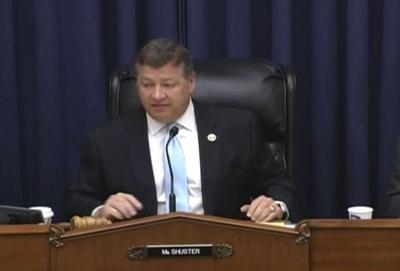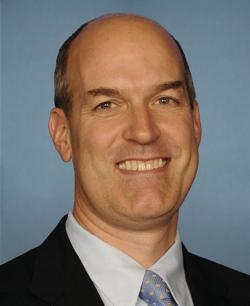Leadership Of House Transportation Committee Divided On The Issue
The House Transportation Committee on Wednesday held its first hearing on the FAA reauthorization that must be passed next month to keep the agency operating, and the focus of the hearing Chairman Bill Shuster's (R-PA) proposal to privatize the nation's Air Traffic Control system.

In opening statements, Shuster and the ranking Democrat on the aviation subcommittee, Congressman Rick Larsen (D-WA), differed on the issue of privatization of ATC.
"This bill provides transformational reform of the U.S. aviation system – something that is absolutely necessary to modernize our air traffic control system, ensure the system is both safe and efficient, and ensure America leads the world in this industry," Shuster (pictured) said in his opening remarks.
"A key reform in the bill takes ATC out of the federal government, and establishes a federally chartered, independent, not-for-profit corporation to provide that service. This corporation will be governed by a board nominated by the system’s users.
"I believe Ranking Member DeFazio and I agree that the status quo at FAA is unacceptable, and that real change is necessary," Shuster said. "We’ve worked together on large parts of the bill, in the same bipartisan spirit as other bills this committee has passed and sent to the President. I think we’re on the same page on many reforms and provisions.
We do have an honest policy disagreement on the approach to fixing ATC.
I have been talking about my ideas for improving ATC for some time, and I’ve put them on the table. I know the Ranking Member has some ideas as well. Today is an opportunity for the Committee to discuss the ideas that have been put forward.
"The AIRR Act takes air traffic control out of the FAA and transitions to the new corporation over three years. This corporation is completely independent of the federal government. This is not a government corporation, a quasi-government entity, or a GSE. The federal government will not back the corporation’s financial obligations.
"The corporation will simply provide a service. The bill doesn’t give the airspace to the corporation – that remains in the public trust. And the FAA remains absolutely responsible for regulating the airspace and aviation safety.
"We do this in a way that protects general aviation and rural communities. Non-commercial GA is exempted from fees or charges, and the corporation can’t tie airspace access to what users pay.
However Larsen said that privatization would be "a science experiment with a lot of potential to go wrong.

"I want to highlight two areas where I think the implications of this mistake are most evident and problematic," Larsen said. "The first deals with NextGen. While we can all acknowledge that implementation has been slow and expensive, it’s now moving forward, thanks in large part to Chairman LoBiondo’s efforts.
"The FAA is finally reaching and passing important milestones on major industry priorities, such as DataComm, multiple-runway operations, performance-based navigation procedures, and programs to reduce taxi times and ground delays.
"So breaking apart the FAA at a time when it is making real and important strides towards NextGen implementation would be unwise."
Larsen also expressed concern about how the Department of Defense fit into a privatized air traffic control system.
"DOD controls nearly 15 percent of the nation’s airspace. But this bill gives the Department of Defense a mere advisory role on the board of directors, a demotion from its current equal-footing partnership with FAA," Larsen said.
"The Department of Defense may have little to no say about routes and airspace, because the bill does little to explain how the Board would make these decisions with DOD."
A full committee markup on the bill is planned for Thursday.
(Images from file)
 NTSB Final Report: Rutan Long-EZ
NTSB Final Report: Rutan Long-EZ ANN FAQ: Turn On Post Notifications
ANN FAQ: Turn On Post Notifications Classic Aero-TV: ICAS Perspectives - Advice for New Air Show Performers
Classic Aero-TV: ICAS Perspectives - Advice for New Air Show Performers ANN's Daily Aero-Linx (06.28.25)
ANN's Daily Aero-Linx (06.28.25) Aero-News: Quote of the Day (06.28.25)
Aero-News: Quote of the Day (06.28.25)




